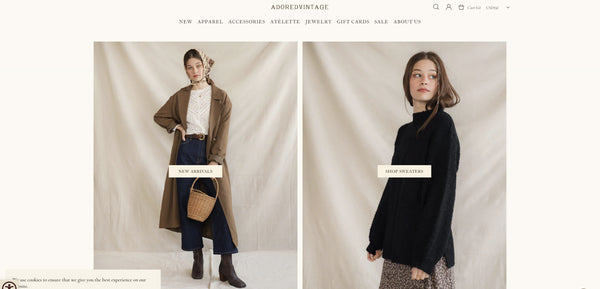Inspiration is crucial not only in creative fields but also in the technological and business sectors. Our team often gets motivated and inspired by other projects to broaden our perspectives, give birth to new ideas, and bring them to life.
So, in this article today, I'll showcase examples of cool, in my opinion, Shopify stores that you can draw inspiration from for creating or implementing ideas in your project! Additionally, you'll discover the secrets to success in implementing a Shopify store.
What components constitute a fantastic Shopify store?

Regardless of what product you're selling, if you're building an online store and aiming for long-term success, you need to incorporate a set of key components.
To kick things off, a strong brand forms the foundation of any successful business. It should be consistent, recognizable on social media and your online store, and resonate with your target audience. The design and functionality of your brand's e-commerce website can also impact its effectiveness. Your e-commerce website must include the following elements:
- Clear and action-oriented call-to-action buttons for your customers.
- A Social Proof Page.
- Product Filtering and Sorting options.
- Clear Product Presentation.
- Mobile Responsiveness.
- Streamlined Checkout and Payment Process.
- Clear and User-Friendly Navigation.
- Creating a visually appealing experience for the Home Page.
- Choosing the right eCommerce platform.
- Contact Page.
For a detailed guide on how to correctly implement and utilize these elements with examples, check out our previous article.
Our Expert Tips. How to create an effective eCommerce strategy

I want to share my observations from over 17 years of experience working with ecommerce clients. These are the things that are highly likely to work and deliver significant results if you focus on them and incorporate them into your ecommerce strategy.
Establish trustworthy relationships with your customers right from the start. Even though there's a plethora of online stores nowadays, you have the chance to outshine the competition by creating impeccable customer service.
Considering a significant percentage of them fail to meet their customers' needs and receive negative reviews, strive to be better. Love and respect your customers, aiming to surpass their expectations.
You can build trust by conveying crucial information on your website, setting up a customer support department, providing contact details for reaching out to you and outlining your product exchange and return policies. Utilize all available methods to earn the trust of your customers.
When developing a website, ensure that your customers remain at the forefront of your focus. Don't assume that developers will think like your customers; make sure you personally step into your customers' shoes and go through the entire website workflow multiple times. Look for points of friction, identify minor disappointments, and address clicks when possible. Bring in people from outside your company, unfamiliar with your product, to validate the experience and ensure it's easily understandable. Lastly, don't neglect your content. Provide detailed explanatory texts, product descriptions, and FAQs to help convert potential customers into clients.
Your personal goals and values serve as the bedrock for your ecommerce strategy. This isn't just a feel-good statement; it's a practical business reality. Your goals will shape your growth trajectory, while your values will influence everything, from your business partners to how you curate your product line.
Establishing product-market fit should be a key goal for any new ecommerce store. This means having a product that not only interests your potential customers (your addressable market) but genuinely excites them about the opportunity to make a purchase.
To achieve product-market fit, thorough research and a deep understanding of your target audience and their needs are essential. It's entirely up to you to decide which customers you're catering to, whether it's a broad category like "women aged 45 to 60" or a specific group like "CrossFit enthusiasts in southern Ontario." To pinpoint your ideal target market, ask yourself: Which group of people do I know requires the type of product I have in mind?
Beyond securing product-market fit, understanding your customers can guide your brand positioning, choice of marketing channels, and customer service standards. If you're unsure where to begin in understanding your potential customers, reach out to five to 10 of them and ask questions about your idea and their needs.
If their responses catch you off guard, continue engaging with more potential customers! In the early stages of your ecommerce strategy, there's almost no such thing as spending too much time conversing with potential customers, given the immense value of their insights.
After completing customer research to validate your initial product, branding, and marketing channels, it's time to shift your focus to the long term. A comprehensive strategy is perfected with a clear vision.
While "vision" might seem like something only the Steve Jobs of the world can conjure, creating one is a relatively straightforward exercise. Simply pose variations of this question to yourself: "What does it look like if we succeed?"
To make it tangible, incorporate a time frame and specificity:
"What does our product line look like in five years if we succeed?"
"What does our brand feel like in five years if we succeed?"
"Who are our key partners (supply chain, resellers, collaborators) in five years if we succeed?"
This process is akin to goal setting, albeit with a distinct purpose. Goal setting helps outline specific actions to reach your vision, while vision setting embraces ambiguity—you don't need to precisely define how you'll get there in five years, just how it looks and feels.
TOP 10 Shopify Stores that can inspire you
Adored Vintage stands out as a top-notch Shopify store specializing in the sale of vintage clothing and modern pieces with a vintage-inspired touch. Navigating the website feels like taking a virtual journey to a charming French countryside. Rodellee Bas, the owner, passionately curates and designs pieces infused with the allure of bygone silhouettes. Beyond the fashion realm, Adored Vintage also gives back by donating a portion of its revenue to support local classrooms. Additionally, Rodellee actively serves as a mentor to fellow women in the business world.

Based in the United States with an estimated revenue exceeding $1 million, this thriving Shopify store boasts a distinctive origin story. Denise Woodard, the founder, crafted cookie recipes for her daughter, who grappled with severe food allergies. Eventually, Woodard decided to share these recipes with others, giving birth to Partake.
Today, the brand showcases an impressive Shopify store that adheres to top-notch ecommerce practices. Notably, the homepage employs multiple compelling headlines such as "Safe to share" and "Because ingredients matter," capitalizing on the appeal to the target audience with a focus on allergy-friendly ingredients.
An intriguing tidbit: Woodard faced rejection 86 times from investors before securing startup funding from an investment company owned by Jay-Z.

Based in the United States with an estimated revenue of $550 million, Gymshark's origins trace back to its founder, Ben Francis, and a team of friends crafting and printing workout clothes. Today, it stands as one of the leading success stories among Shopify stores in the fitness clothing industry.
Gymshark pioneered the influencer marketing model early on, dedicating efforts to establish a significant social media presence from the outset. A notable collaboration involved a workout video featuring Ross Edgley, the trailblazer who accomplished the remarkable feat of swimming around the entire 1780-mile coast of Great Britain.

Situated in the United States, specifically California, Haus is making strides with an estimated revenue surpassing $5 million. The brand is capitalizing on the Millennial generation's inclination towards moderate and sophisticated drinking preferences—a trend that gained momentum during the pandemic, with alcohol sales experiencing a 22% growth.
What sets Haus apart from major alcohol brands is their commitment to using grapes in their products, ensuring a natural composition and lower sugar content. This distinctive approach aligns with the evolving preferences of consumers seeking a more refined and health-conscious drinking experience.

Located in Australia, specifically Queensland, Hismile has achieved an estimated revenue surpassing $20 million. The brand excels in promptly conveying the benefits of its teeth care products, utilizing original formulas for color correction. Given the uniqueness of their offerings, establishing trust with visitors becomes a paramount goal.
In their quest to raise awareness about their innovative products, Hismile harnessed the power of a social media influencer army. During a holiday period, the brand reached its pinnacle of awareness, successfully selling $5 million worth of products. This feat was accomplished through a strategic blend of influencer marketing, featuring endorsements from notable figures like Kylie Jenner, and various website sales tactics.

Based in the United States, specifically California, this Shopify store boasts an estimated revenue exceeding $15 million. While ColourPop may not claim the throne for the most visually stunning design, it stands as a prime example of the profound influence of social media on business expansion. ColourPop burst onto the Instagram scene in all its colorful splendor back in 2017, captivating regular users, vloggers, and influencers alike.
Numerous influencers, including Jaclyn Hill (with 7.2 million followers) and NikkieTutorials (with 15.6 million followers), featured ColourPop on their channels. This strategic move has solidified the brand's reputation as "wallet-friendly" and "super-Instagrammable," establishing these qualities as their primary competitive advantage.

Situated in the United States, specifically California, this Shopify store stands out with an estimated revenue surpassing $200 million. It's the brainchild of Kylie Jenner, where she markets a diverse range of products, including makeup, skincare, and baby items. Notably, Kylie herself frequently serves as the model for the store—a savvy move in the world of influencer-led businesses.
What elevates Kylie Cosmetics to the ranks of the best Shopify stores is the compelling presence of social proof. For instance, customers can peruse testimonials highlighting tangible results, such as "98% agreed the formula is transfer-proof and smudge-proof," sourced from a page featuring the Kylie Friday Lip Kit.

Situated in the United States, Steve Madden boasts an estimated revenue of $5 million from its ecommerce store, making it one of the largest Shopify stores globally. Originally a retail-focused company established in 1990, Steve Madden has seamlessly adapted to the digital age with an impressive Shopify-powered store that defies any notion of being outdated.
Browsing through the homepage evokes a sensation akin to flipping through an online edition of Vogue or Marie Claire. This ambiance is crafted through vintage-style product photography and elegant fonts. Enhanced by an integrated Instagram feed, the Shopify store's homepage serves as a treasure trove of inspiration for avid shoppers.

Based in the United States, specifically California, this Shopify store boasts an estimated revenue ranging from $5 to $7 million. Specializing in classic men's clothing with a modern twist, the website exudes a cool ambiance reminiscent of a high-end retail store the moment you land on its homepage. The vintage feel is meticulously curated, with particular emphasis placed on product photography.
Behind the scenes, Taylor Stitch operates on a unique hybrid business model. The founders have strategically stocked essential products, while over 90% of the remaining items are crowdfunded. This innovative approach not only minimizes waste but also reduces overhead costs for the company.

Established by a seasoned professional within the industry, Macguire Shoes emerged from the desire to create a distinctive shoe brand, fueled by the founder's fashion-forward environment in Montreal, Canada. Myriam Belzile-Macguire kickstarted her venture by cultivating strong ties with factories. The success of her brand lies in its exceptional designs and an online store that effectively encapsulates the lifestyle of its target customers.

Summary
Creating a successful ecommerce project is no small feat. However, with a well-defined action plan and consideration of expert advice, everything is sure to fall into place.
If you need assistance in building a Shopify store from scratch, migrating to the Shopify platform, or redesigning your existing store, feel free to get in touch with us. We've got all your needs covered.





